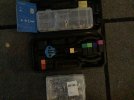Not sure where to ask this but figure here is good enough. Never used them before.
So I know I have an issue with a broken bolt in a captive nut. So am thinking that this may work. Going to have try to drill a broken bolt that I can’t really see, so dont have high hope of success and will end up swearing all the way to the coffee pot. So want backup. Drilling a new hole would be easy.
Its not a structural thing.
But.
So am thinking the stainless 1s are harder to squish, but are more likely to let me get the bolt out in the future, (do I need to I don’t know but never say never).
I am also not sure if there is enough space to get those tools in, will they even do stainless inserts. Do I really need SS insets?
Do I need a tool because it could be tight for space. Seems it can be done easy enough with a bolt,nut and washer.
Going shopping on Geoffs site soon.
So experiences folks good or bad.
Cheers.
J
So I know I have an issue with a broken bolt in a captive nut. So am thinking that this may work. Going to have try to drill a broken bolt that I can’t really see, so dont have high hope of success and will end up swearing all the way to the coffee pot. So want backup. Drilling a new hole would be easy.
Its not a structural thing.
But.
So am thinking the stainless 1s are harder to squish, but are more likely to let me get the bolt out in the future, (do I need to I don’t know but never say never).
I am also not sure if there is enough space to get those tools in, will they even do stainless inserts. Do I really need SS insets?
Do I need a tool because it could be tight for space. Seems it can be done easy enough with a bolt,nut and washer.
Going shopping on Geoffs site soon.
So experiences folks good or bad.
Cheers.
J
